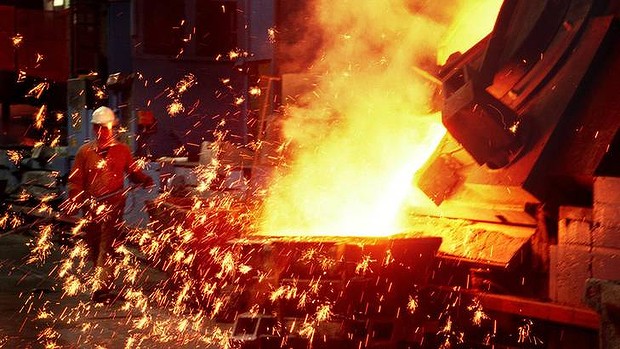Insightful Insights
-

MEDIA
Three cliches that cost you money
Roger Montgomery
November 10, 2012
In this Australian article published 10 November 2012 Roger discusses why listening to share market cliches is likely to result in poor portfolio returns. Read here.
by Roger Montgomery Posted in In the Press, Insightful Insights, Investing Education.
-

Global mining capital expenditure peaking in 2012?
David Buckland
November 9, 2012
World Steel Production, according to Macquarie Equities, has been cut by 4 per cent to an average 1.7 billion tonnes per annum over the 2013-2015 period.
China’s steel production accounts for an average 760 million tonnes or 47%, approximately 50 million tonnes more than their forecast average demand.
Global mining capital expenditure is expected to peak in 2012 at $142b and decline by around 10% per annum to $115b by 2014.
Earnings downgrades are being experienced by major excavator companies like the Japanese listed Komatsu, where mining equipment makes up 30% of its US$22b revenue line.
by David Buckland Posted in Energy / Resources, Insightful Insights.
-

New Car Anyone?
Roger Montgomery
November 8, 2012
By Russell Muldoon & Roger Montgomery
We like to keep an eye on monthly new car sales statistics produced by the Federal Chamber of Automotive Industries. For a number of businesses we are interested in, including Carsales and ARB Corporation, they are both beneficiaries of a high level of new vehicle turnover.
by Roger Montgomery Posted in Insightful Insights, Investing Education, Manufacturing.
-

RBA favours ‘riskier’ investments?
Tim Kelley
November 7, 2012

In the wake of the RBA’s decision to leave interest rates unchanged it’s interesting to see some of the commentary on the attractiveness of fixed interest versus ‘riskier’ investments, including property and shares. RBA governor Glenn Stevens is reported to favour investors moving into these asset classes away from low-yielding term deposits.
We have recently been doing some interesting analysis to better understand the long-term value proposition currently offered by the Australian equity markets. We will share the results of the analysis here when completed, but the emerging view – for those with a long-term perspective – is that governor Stevens has a valid point.
by Tim Kelley Posted in Insightful Insights, Investing Education.
-

MEDIA
What are David Buckland’s insights into Small Cap Mining stocks?
Roger Montgomery
November 6, 2012
Do Imdex (IMD), Sundance Resources (SDL), Woodside (WPL), Axiom Mining (AVQ), Seven West Media (SWM), Silverlake Resources (SLR), Mesoblast (MSB), Titan Energy (TTE) , Metcash (MTS), Emeco (EHL) or Magellan (MFG) achieve the coveted A1 grade? Watch this edition of Sky Business’ Your Money Your Call 6 November 2012 program now to find out, and also discover how David approaches investing in small cap mining stocks. Watch here.
by Roger Montgomery Posted in Companies, Insightful Insights, Market Valuation, TV Appearances.
-

Know your Options
Tim Kelley
November 1, 2012

From time to time we are asked about option strategies. There are many different types of option strategy, and the merits of any given one depends very much on the particular strategy and the circumstances, but there are a few general principles that are worth keeping in mind. These include:-
– Buying or writing options is a zero sum game. This means that when one person sells an option to another, one of them will win and the other will lose. This is in contrast to ordinary shares where it’s reasonable for all long-term investors to expect a positive return
continue…by Tim Kelley Posted in Insightful Insights, Investing Education.
-

Taking advantage of the rising Asian tide
David Buckland
October 31, 2012
In releasing the Government’s white paper, Prime Minister Gillard told the Lowy Institute the 21st Century would see Asia’s return to leadership. Asia’s rise was “not only unstoppable, it is gathering pace.” Treasurer Swan said Australia “must continue building on our strengths to take advantage of the opportunities that are unfolding in the Asian region”. Large productivity gains is a major focus of the white paper.
Of the twelve separate categories that make up the rankings in the “Global Competitiveness Report” from the World Economic Forum, “Labour Market Efficiency” remains Australia’s nemesis. If our political leaders are serious about productivity gains and workplace reform, then our poor record in areas like burden of government regulation, wastefulness of government spending, flexibility of wage determination and infrastructure bottlenecks need to be urgently addressed.
by David Buckland Posted in Insightful Insights, Value.able.
- save this article
- POSTED IN Insightful Insights, Value.able
-

When a ‘Sighting Shot’ is the only shot
Roger Montgomery
October 31, 2012
We have been watching with some interest the attempts by the Steelmakers Australia consortium to engage with the Arrium board (not that we have ever owned shares in Arrium).
Often in an unsolicited takeover offer, the initial bid will be a “sighting shot”, which the board will quickly reject. According to the conventional storyline, the bidder then ups the offer, the target board relents, and shareholders are left with the impression that the board has managed to secure a better deal for them.
In the case of the Arrium bid, Steelmakers Australia appears to have diverted somewhat from the standard script. They have come back with some modifications to their original proposal (shorter due diligence, evidence of funding capacity), but have not lifted the price.
This is not be a good sign for the Arrium board, nor its shareholders. It indicates that Steelmakers Australia sees itself having a strong negotiating position.
The reason for this may be the $2.14b of debt on Arrium’s books. Steelmakers Australia may expect that Arrium’s directors will be reluctant to negotiate too hard lest the offer disappear, leaving the debt problem to be resolved by the board.
by Roger Montgomery Posted in Insightful Insights, Manufacturing.
- save this article
- POSTED IN Insightful Insights, Manufacturing
-

Rate Shock
Roger Montgomery
October 29, 2012
With all the talk of productivity, cost competitiveness, the currency and interest rates, and because we are rolling over tens of millions in TD’s (that were paying five per cent) I thought it worth sharing what Term Deposit (TD) rates are on offer now (see ‘More’ below). We have written extensively about the loss of purchasing power now affecting hundreds of thousands of retiring boomers so the low rates are nothing short of shocking and understandably force many investors to buy high yielding stocks like Telstra.
by Roger Montgomery Posted in Insightful Insights.
- 6 Comments
- save this article
- POSTED IN Insightful Insights
-

MEDIA
Go against the flow and thrive
Roger Montgomery
October 27, 2012
In this Australian article published 27 October 2012 Roger discusses how behaving counterintuitively may result in better performance for your portfolio. Read here.
by Roger Montgomery Posted in In the Press, Insightful Insights, Investing Education, Market Valuation.